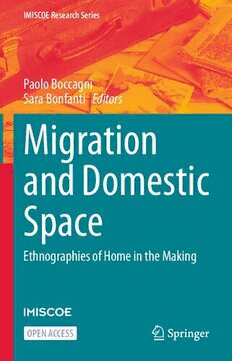
Migration and Domestic Space: Ethnographies of Home in the Making PDF
260 Pages·2023·6.21 MB·English
Most books are stored in the elastic cloud where traffic is expensive. For this reason, we have a limit on daily download.
Preview Migration and Domestic Space: Ethnographies of Home in the Making
Description:
This open access book provides insight into the domestic space of people with an immigrant or refugee background. It selects and compares a whole spectrum of dwelling conditions with ethnographic material covering a variety of national backgrounds – Latin America, North and West Africa, Eastern Europe, South Asia – and an equally broad range of housing, household and legal arrangements. It provides a fine-grained understanding of migrants’ lived experience of their domestic space and shows the critical significance of the lived space of a house as a microcosm of societal constellations of identities, values and inequalities. The book enhances the connection between migration studies and research into housing, social reproduction, domesticity and material culture and provides an interesting read to scholars in migration studies, policy makers and practitioners with a remit in local housing and integration policies.“This wonderful edited collection extends our understanding of migration not only into the confines of the domestic space but also into the territory of the ethnographer. What does it mean to be a guest in a migrant home? This collection of chapters traverses this question in diverse settings and circumstances of homemaking […]. Boccagni and Bonfanti have skilfully created an intricate lace of ethnographic accounts that provides a nuanced understanding of the built environments where migrants live, how they relate to their homes and how this is articulated in their attitudes toward majority society. The chapters, each on its own and together as a collection, advance our understanding of the researcher being a guest in the migrant home, just like the migrant being a guest in the host country. This complexity of ethnography and positionality makes this edited book an essential reading for migration scholars and ethnographers alike!”Iris Levin, Lecturer in Urban Studies, RMIT University, Melbourne, Australia“This book demonstrates how ethnographies of home and dwelling can bear on the study of migration and its manifestation in domestic space. Entering someone’s home as a researcher challenges our ethical registers: the researcher moves between being a stranger and a guest. The authors point to the dilemmas researchers encounter in intimate settings and how they might be resolved. A valuable and timely book for researchers on dwelling, home and movement.”Cathrine Brun, Professor of Human Geography, Centre for Lebanese Studies, Oxford, UK "This excellent collection delves into the relationship between migration, domesticity, and material culture. It is ethnographically rich and impressively varied in its geographical scope, with insights that will prove extremely useful to scholars and practitioners alike. The great strength of the volume lies in the fascinating diversity, granular detail and methodological care of the contributions, with authors deploying concepts and arguments that prepare a great deal of fertile ground for future work."Tom Scott-Smith, Associate Professor of Refugee Studies and Forced Migration, University of Oxford “This insightful collection departs from the simple yet significant question of roles: What happens when the researcher/participant relationship, becomes guest/host instead? By seeing and interpreting domestic spaces as ethnographic field sites, the contributions shed light on refugees’ and other migrants’ lived experiences of home and housing. Drawing on empirical evidence from diverse types of homes, across geographic locations, Migration and domestic space: Ethnographies of home in the making offers valuable and fresh perspective, encouraging new connections between material and emotional, public and private, in migration research.”Marta Bivand Erdal, Research Professor in Migration studies, Peace Research Institute Oslo (PRIO).
See more
The list of books you might like
Most books are stored in the elastic cloud where traffic is expensive. For this reason, we have a limit on daily download.
